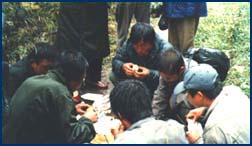The Mad Kingdom, Part I: Bleak Prognosis
This weekend, I was reading one of the old National Geographics that litter my house, and started reading “Albanians: A People Undone,” in the February 2000 issue. At the time, NATO had just moved into Kosovo, and Albania proper was emerging from the legacy of 40 nightmarishly oppressive years under dictator Enver Hoxha. In the late 1980’s, Hoxha and Kim Il Sung were two of the last leaders on earth commonly termed “Stalinist,” although regimes’ secular state religions drew heavily on nationalism and traditional social beliefs. Both relied on self-imposed isolation to prevent the rise of challenges to their respective regimes. Hoxha’s regime, widely regarded as the most oppressive regime in Europe until 1990, still never compared to Kim Il Sung’s in terms of ruthlessness.
Yet the precise character of the Hoxha regime wasn’t what interested me about the article as much as what Hoxha’s legacy said about the social and psychological trajectory of post-juche North Korea. This is the specific phrase that grabbed me:
“When Hoxha died, everybody cried,” said Ada Kongoli, a young lawyer in Tirana, Albania’s capital. “Oh yes, we had to cry. If someone caught you not crying, you’d be arrested.
The article continued:
Albania was the most rigid and isolated state in Eastern Europe, the last to emerge from the past and the least capable of dealing with the future. “The communists killed the spirit of the people of Albania,” said Pandeli Pasko, the former Albanian ambassador to Italy. “They put the party over the national culture. Yugoslavia still had a window to the world. Albania had no window. It was closed in darkness.
Instead of roads [long-time dictator Enver] Hoxha built countless concrete bunkers that still litter the landscape like fossil mushrooms. He left a population so out of touch with reality that many thought theirs was the most prosperous nation in Europe.
The article goes on to note the thousands Hoxha killed, and the tens of thousands he jailed or exiled. The official toll, if it is complete, is miniscule compared to the likely toll in North Korea. Yet Hoxha killed more than people; he destroyed individuality in favor of statism, moral absolutes in favor of the good of the state, and objective reality in favor of a subjective illusion of a state-imposed paradise on earth, which brings us to this:
The channel between Italy and Albania is thick with smugglers hauling prostitutes, narcotics, and illegal refugees. Officials say Albania is the western terminus of a “Balkan route” of drugs from southwest Asia that accounts for an estimated 80 percent of the drugs moving into Western Europe.
“We did not invent organized crime,” said Ermal Hasani, a political scientist in Tirana, “but in our society there is enough of a vacuum to implement it in a perfect way.
Albania was another of those highly regimented societies that no one thought would ever collapse right up to the hour before it actually did. In its wake, it left a people hungry for freedom and wealth, but without the one remaining source of ethical limitations on those pursuits.

ANSONG, Kyonggi Province _ A female North Korean defector clutches her baby tighter to her breast as her eyes widen upon seeing a group of reporters approach.
When some begin to ask her what they think are friendly questions, the 29-year-old woman who came to Seoul via Myanmar almost loses her balance as she steps back up the stairs behind her. Sensing her apparent nervousness, some give up and leave.
As a result, 20% of North Korean defectors, an increasing percentage of them women, now need psychiatric care (psychiatric being the kind that can involve treatment with drugs; no figure was given for the percentage with psychological problems).
“Most of them have undergone too many dramatic situations, such as crossing rivers,” said a 53-year-old female North Korean defector who graduated from Hanawon in 2000 and has been working as a consultant and lecturer here since last June.
“Their state of mind is like a balloon that is about to burst because of the stress from such memories,” said the woman, who does individual counseling for defectors, making the most of her experience as a teacher in North Korea, on condition of anonymity.
“I try to calm them as best as I can. There are some feelings I understand better being a defector myself,” she said in the interview.
What the article doesn’t mention, for understandable reasons, is that the overwhelming majority of female defectors are believed to have been forced into sexual slavery at some point.
One of the premises of the current South Korean government’s policies is that they will help achieve a “soft landing” for North Korea. But eight years after the declaration of Sunshine, the North continues to grow markedly poorer, hungrier, and more miserable, and the cost of eventual reunification continues to rise. Among the costs that appears in relatively few estimates for rejoining North and South into a single nation is the North Korean regime’s progressive psychological and social destruction of those whom it does not succeed in destroying physically.
1 Response